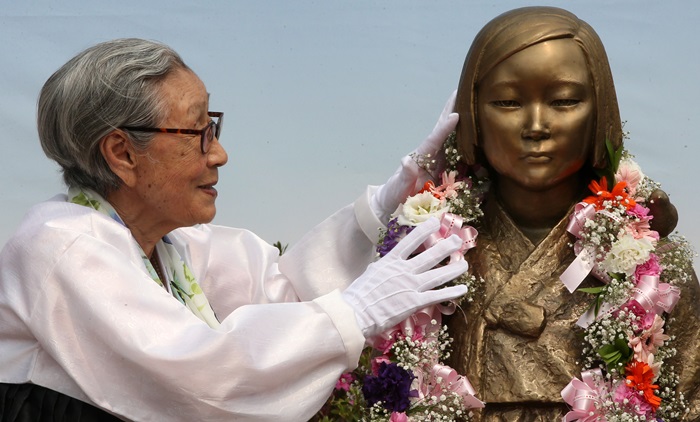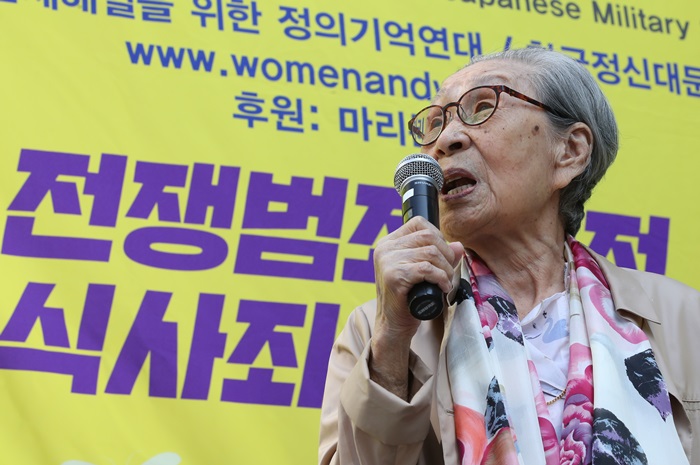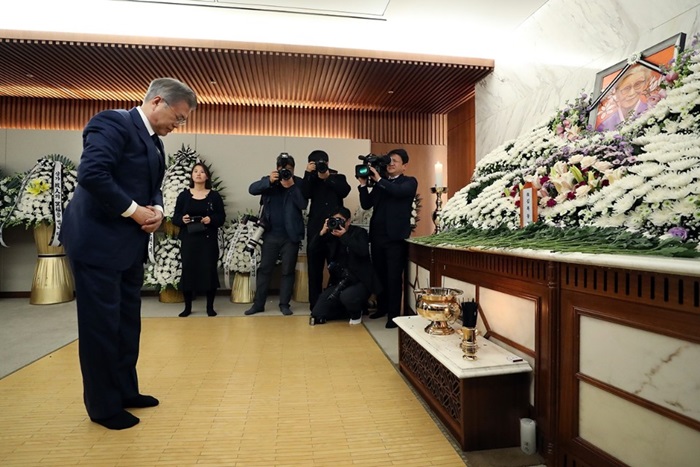-
 Korea.net's 24-hour YouTube channel
Korea.net's 24-hour YouTube channel- NEWS FOCUS
- ABOUT KOREA
- EVENTS
- RESOURCES
- GOVERNMENT
- ABOUT US

Kim Bok-dong in April 2014 touches the Statue of Peace, a memorial to victims of Japan's wartime sexual slavery like Kim, at Seongnam City Hall's Front Plaza in Seongnam, Gyeonggi-do Province. (Yonhap News)
By Park Gil-ja and Kim Minji
Kim Bok-dong, a sex slave during the Japanese colonial period who later fought to hold Japan accountable for its war crimes against victims like herself and whose life inspired the 2017 Korean movie "I Can Speak," passed away on Jan. 28. She was 93.
President Moon Jae-in visited Yonsei University’s Severance Hospital in Seoul on the afternoon of Jan. 29 to pay his final respects to her, and was joined by many other citizens and politicians.
Kim had fought cancer for a year, with her last words reportedly being "Rage toward Japan."
"Before drawing her last breath, she expressed her last outrage against Japan," said Yoon Mi-hyang, president of the Korean Council for Justice and Remembrance who stayed with Kim until her death.
"Her last words were 'Please keep fighting for the comfort women issue until the end.'"
Kim's funeral is scheduled for Friday morning in Seoul, along with a traditional farewell road ceremony in her honor.

Kim Bok-dong on Oct. 3, 2018, blasts Japan for trying to have a naval vessel hoisting the "rising sun" flag used by the Japanese military during World War II during a naval review on Jeju Island in a rally at the former site of the Japanese Embassy in Seoul. (Yonhap News)
In 1992, Kim came forward with her experience of sexual enslavement by Japan and in June 1993, she testified on the Japanese military's brutality at the World Conference on Human Rights in Vienna, Austria. She also attended weekly rallies every Wednesday in front of the Japanese Embassy in Seoul and described the horrors she endured. Even after losing sight in her left eye, she traveled the world blasting the Japanese government for its past atrocities and demanding justice for victims like herself.
"Why do you call us 'comfort women?' We were forced to be sex slaves by Japan and will never be free until the comfort women issue is resolved," she said in a media interview.
Kim served as the champion of numerous sexual slavery victims as well as a human rights and peace activist, describing the hell she went through every year abroad. Along with fellow victim Gil Won-ok, she established the Butterfly Fund to help children in conflict areas and victims of sexual violence in wars.
Another former sex slave died on the same day as Kim, reducing the number of surviving victims to 23.

President Moon Jae-in on Jan. 29 pays his final respects to the late Kim Bok-dong at Yonsei University’s Severance Hospital in Seoul. (Cheong Wa Dae)
Most popular
- First hearing-impaired K-pop act hopes for 'barrier-free world'
- 'Mad Max' director impressed by 'cinema-literate' Korean viewers
- Romanian presidential couple visits national cemetery
- 'Korean mythology is just as wonderful as Greek and Roman'
- Hit drama 'Beef' wins awards from 3 major Hollywood guilds













